#I've actually started looking for episodes in different languages other than English and Japanese
Explore tagged Tumblr posts
Text



"The police girl made the choice for herself."
"This was a perfect night... right?"
#Hellsing#hellsing gonzo#alucard hellsing#seras victoria#hellsing 2001#I've actually started looking for episodes in different languages other than English and Japanese#AYO the German dub of Alucard f u c k s#Like gawd. DAYUM.
30 notes
·
View notes
Text
My language learning journey
Hi! I'm Anja, a language learner and manga artist from Germany. This is my first post here, so I think I should start with some information about myself:
I speak: German (native), English
I'm currently learning: Japanese
Paused languages: French, Russian
Other hobbies and interests:
creating manga (you can find my artist accounts here)
reading manga (mainly shonen)
nature
video games (e.g. Assassin‘s Creed Origins / Valhalla, Ghost of Tsushima, Cyberpunk 2077, Control)
reading different kinds of books
history & archaeology (especially ancient egypt)
For those who are interested, here is a summary of my ups and downs as a language learner:
How I improved my English unintentionally
English is not my native language (I'm sure I make mistakes ^^;). I learned the basics at school which means: vocab lists, grammar rules and exercises, listen to English spoken by non-native speakers (teacher and classmates) and only sometimes by native speakers (audio CD). I had no access to novels, websites or other interesting things in English. And I was fine with that. At that time, English was only a subject in school.
After graduating, I became interested in Japanese. I found some german online forums where other learners of Japanese shared their experiences. Unfortunately, most of the users were very narrow-minded. They persisted, that their way of learning is the only "right" way. I never liked black-or-white-thinking and so I left these forums.
I've found a more open-minded forum and some blogs. These were in English, but I came across many different ideas and methods. It was a bit difficult at first because I never read "real" English before. But I concentrated so much on the content, that everything else became secondary.
At this time, the new episodes of my favorite TV show weren't available in German. So I watched them in English even though I had nearly no experience with listening to native speakers. There were things I couldn't understand, but I didn't care. I was able to watch this show quite comfortably which was all I wanted — reaching a high level in English was not my goal, after all.
Watching my favourite show, reading articles about interesting topics or reading novels in English were never learning activities to me. The purpose was to learn something other than English or to simply enjoy the content. The language was only a tool, not a study object.
While doing this, I never thought "So many unknown words… I should use Anki to learn them". After learning the basics at school, I just started reading and listening and ignored most of the unknown and unimportant parts. Only when I felt that I really need to know a certain word I looked it up. These texts or videos weren’t study objects. After reading/watching them I moved on. Without realizing it, English became part of my life.
Today, reading and listening to content in English feels natural to me. There are words I don’t know and I make mistakes, of course, but I'm fine with that.
The learning mindset is actually a learning barrier
In the case of Japanese, I always tried to understand as much as possible, looked up many words, put sentences into Anki and things like that, because many methods recommended that. I thought that otherwise my Japanese won't improve.
Ironically, even after so much hard work and after trying out so many methods and techniques my Japanese was by no means as good as my English.
I was stuck in a "learning mindset" which made it difficult to just enjoy the content as I did with English. I wasn't able to focus on the content. All I saw were unknown words and phrases. It was like a curse.
Don't get me wrong: Good advice is useful, of course! When I come across an interesting approach or tip I try it out to see if it works for me. But my mistake was to believe that I only had to follow someone else's way of learning from A to Z and I would get the same results in the end. It never worked this way.
That's why I encourage everyone not to follow blindly other methods and their creators. There is no right or wrong. Combine whatever works best for you and trust your own intuition. The most important thing is that you enjoy what you are doing.
Combining minimalism with language learning
After worrying so much about language learning, methods and my Japanese, I discovered minimalism and was completely fascinated.
Generally, minimalists don't keep things that make them feel unhappy, that are no longer useful or causing distraction. It depends on the person, how their minimalist lifestyle looks like. And this is also true for language learning.
This mindset was a great inspiration for my current way of language learning. I only use Anki to review kanji, for example, because this works best for me. But whenever I use it for vocabulary/sentences, it feels so meaningless to me compared to reading a good book. I can't use Anki for vocabulary longer than a few weeks, but I feel always relaxed when I read a book in Japanese.
That's why I decided to just look up certain words, write them down and move on. Maybe other methods are more efficient, but I prefer learning words in their natural context. This is what I enjoy the most.
How my Japanese improved (finally)
For a long time, I felt like I hit a wall. My Japanese didn’t seem to improve. Then I focused on extensive reading and read several books in Japanese that were not too difficult at my current level (e.g. volume 1 - 4 of 『ハリー・ポッター』 and 『天気の子』 and other manga and light novels).
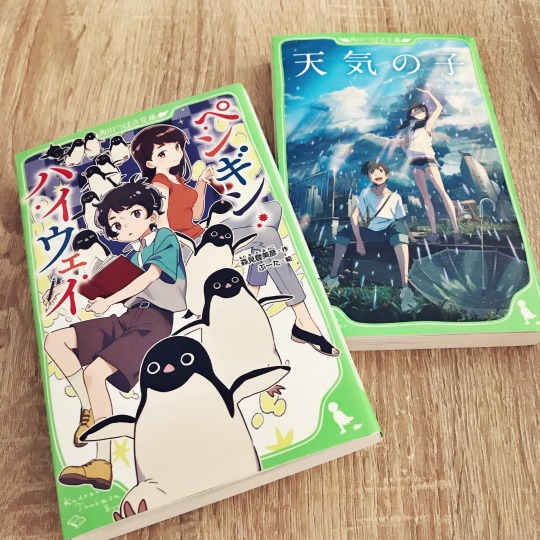
This helped me a lot to improve not only my reading speed but also my vocabulary. I had so much fun reading these books that I read between 20 and 40 pages a day (sometimes even a bit more on the weekend). My listening comprehension stagnated for a long time but thanks to reading it now improves slowly but steady.
The more I understand the more I enjoy listening. Lots of reading helped me to increase my vocabulary and to get to the point at where I can process spoken Japanese much faster than before.
It feels strange sometimes. For a long time, it was normal to me that I understand not more than single words or very common phrases. Listening felt like a waste of time. Now I can roughly follow the story of some audio books, for example. Even small improvements like this give me a big motivation boost!
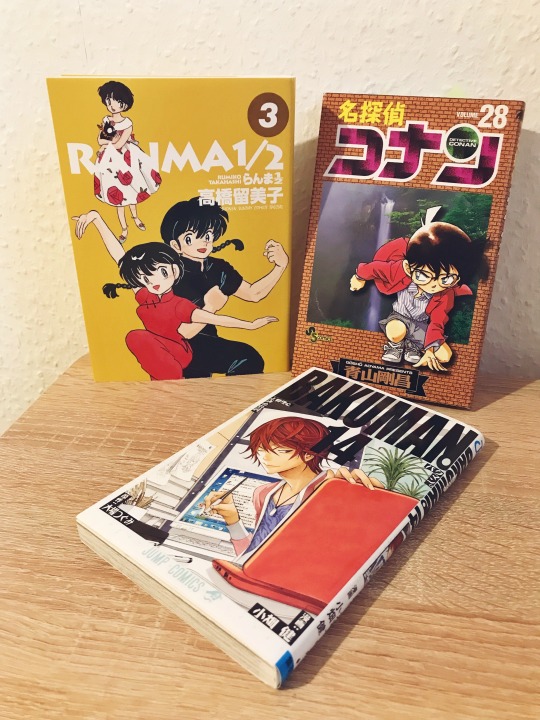
Switching to extensive reading had also a positive effect on my self-confidence as a language learner. I’m more aware about what kind of content I need at my current level and choose my reading and listening material accordingly. I will read more and more difficult books to increase my vocabulary and to get used to more complex writing styles. It should be a bit challenging but not overwhelming.
Up to this point, I've read 78 books in Japanese so far. 27 of these were novels, light novels or non-fiction books; the rest were manga. According to 読書メーター, I've read around 18.242 pages in total.
Now
It took me a long time but today I don't care so much about efficiency and speed anymore. I just want to enjoy what I'm doing. I have still a long way to go, of course. But even though I don't understand everything I enjoy reading in Japanese so much! And I hope to further improve my listening comprehension so that I can comfortably understand audio books and podcasts.
My main activity is still reading books and other content but I also do light grammar study now. In my experience, you don't need to memorize grammar rules but a good foundation is important to understand more complex content and to build correct sentences yourself. That's why I think that grammar is not your enemy but a useful tool.
Lots of text, sorry. ^^; I hope it was interesting to some of you.
Please note that I write about what works for me and share advice based on my own experiences. If you have a different opinion or if you use other methods, that's absolutely fine. Do whatever works for you.
From time to time, I'll write posts about my recent language learning activities and thoughts.
90 notes
·
View notes
Text
Language Learning Through Immersion: One Year Japanese Update
11/03/2021
I did it, you guys! I’ve successfully reached my very first year of Japanese language immersion! I honestly thought that I would have given up by now, but this really has been a fun and ultimately rewarding endeavor.

Studying the language has been at the back of my mind for years since elementary school, I just never really knew how to go about it before, and I always thought that I could learn it in a classroom setting someday. That someday for me was in two elective courses in university, and while those were fun as well, it did not give me the same gains that I have achieved in this past year.
It’s probably easier to quantify learning a language in a classroom setting, especially when going through a program to earn a language degree. Learning through immersion, however, I had to really consider what my goals should be on my own. Eventually, I stumbled upon an article saying that for an English speaker, Japanese was exceptionally difficult to learn and that at least 2,200 hours must be spent with the language to reach a certain level of proficiency. So I said to myself, “well okay internet, if you say so!”, and set that as my long term goal going forward.
Spoiler Alert: I did not hit that goal in my first year. I am not crazy and will never listen to Japanese in my sleep regardless of what Khatzumoto (the creator of All Japanese All the Time) says.
I did, however, hit a total 1,226.65 active immersion hours in my first year, so I guess I’m still a bit nuts. That is 874.96 hours of active listening and 351.69 reading hours. I also did 270.59 hours of passive listening, also known as the time in the very beginning of my immersion where I was using Japanese subtitles (therefore not really concentrating on listening alone). That’s a cumulative 1,497.24 hours spent with Japanese. That’s more than halfway towards my goal!
To further break that down for curious animanga fans out there, that’s 973 episodes from 109 anime, 765 episodes from 33 dramas, 7 movies, and 967 chapters from 107 volumes of manga (21 series). Here’s my anilist and mydramalist to see what I’ve read/watched.
During all this, I was also doing my daily Anki reps and now I have a 530 day SRS streak (includes the time prior starting immersion and only doing RTK and some vocabulary cards) and a total 8,857 sentence cards. I’ve been averaging 406 cards daily (because I’m trying to cure my leeches) and I spend about an hour per day doing reps and learning new cards. I don’t really track my time on Anki, but I do have a set timer that goes off after 1-1:30 hours.
What I haven’t touched upon at all is output. I have not gone out of my way to find a tutor or a language partner. There’s still plenty of input out there to immerse in before I even consider outputting.
Graphs, stats, and more thoughts:
Here's my current card count in my main deck (minus the cards in my new/learning queue and leeches I've been relearning which are in separate decks):
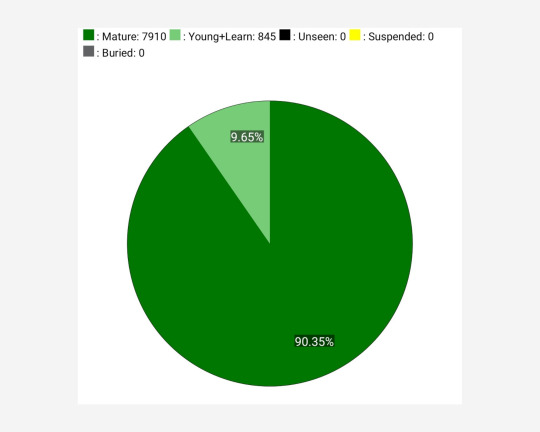
That one day in 2019 where I did not do my cards because I was seriously doubting whether I can actually stick with language learning this time around will forever haunt and inspire me to keep going everyday.
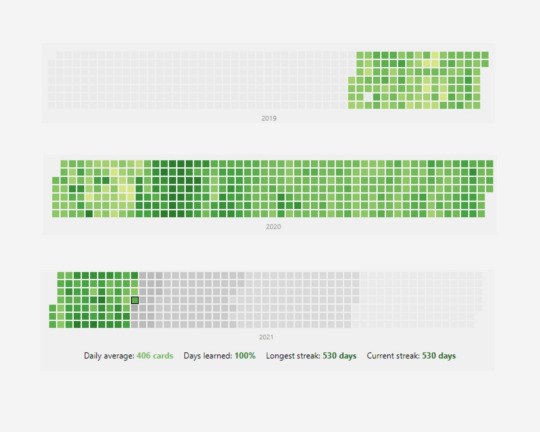
Workflow and Tips
You might be wondering, how do I have a lot of time? I started this whole endeavor in the middle of a pandemic, which eliminated the option of me going to a language school, and a slew of other things I were considering doing last year became impossible (and if anything, very scary to do in a pandemic). All I can say is that, things work out eventually if it is His will, and if I can learn a skill before everything properly settles back down again, then why not?
I wake up at 5 in the morning everyday to either do my Anki reps or read until the time when I need to get up and I listen to compressed audio throughout the day. The biggest tip is to switch the time you spend watching/reading in your native language to your target language instead. Listen to a podcast during your commute, watch an episode during lunch break, read before going to bed, do your Anki reps in the bathroom if you have to.
But, if you’re feeling burnt out, there is no reason for you to not take a break! I have been watching a lot of Among Us streams before bed, and I chat with my friends from time to time. Language learning is not a race.
More Stats
Here are a couple of grids of the kanji characters that I have encountered at least once in my immersion and how well I have answered them in my vocabulary/sentence cards.
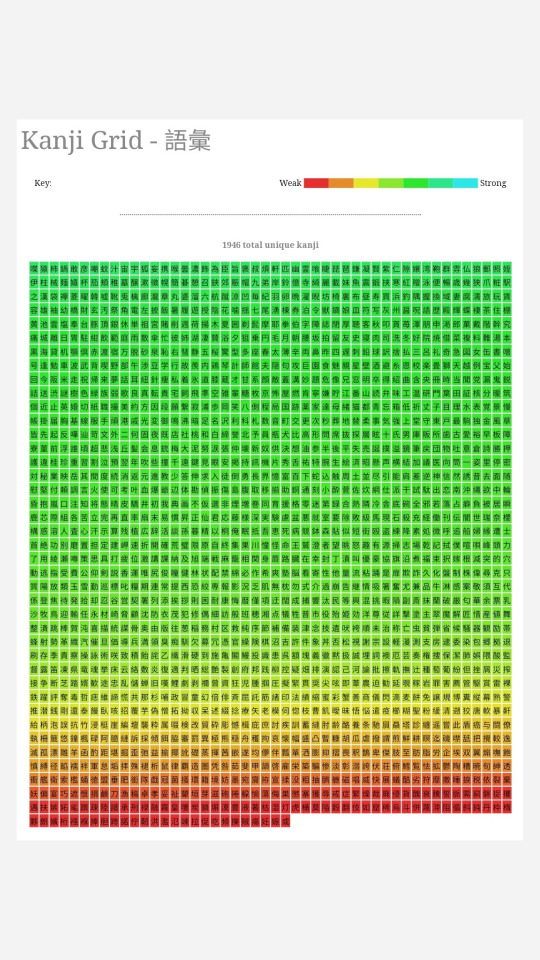
It's interesting that after almost 9000 words, I have yet to encounter every single character from the Remembering the Kanji 1 (RTK 1) book by James Heisig, which teaches you the most common use characters that are part of the 常用漢字. Which brings me to the question, was writing down every single character being taught in RTK worth it every time it came up in my reviews for the first 3-ish months I was reviewing them? Maybe, maybe not. It certainly removed my anxiety whenever looking at blocks of text in Japanese, but the longer I think about it, the more I feel I should have switched to Recognition RTK earlier. Still, being able to write in proper stroke order is cool I guess, and it also helps me when looking things up in the dictionary.
Here’s the same grid but in JLPT order:
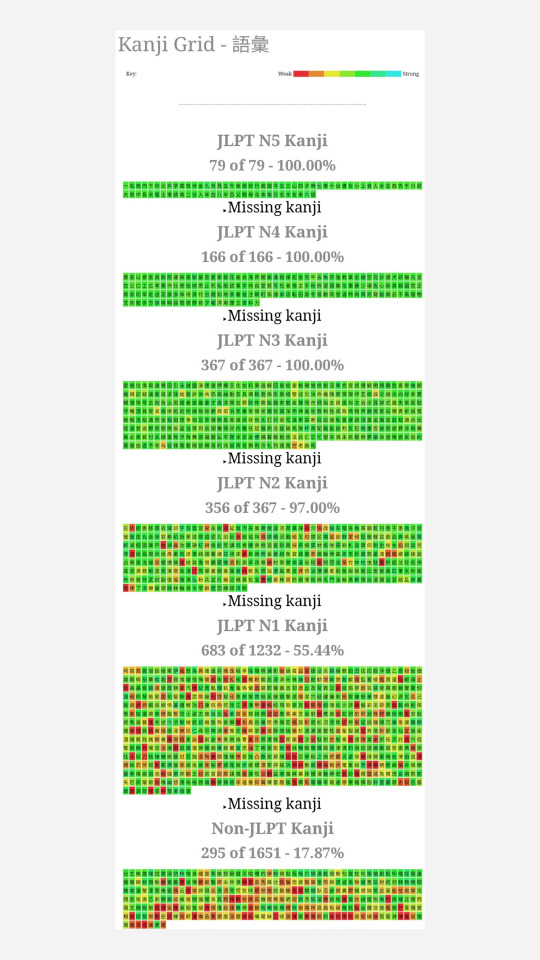
I clearly need to grind those N2 and N1 level cards! Speaking of which, I have apparently almost covered every single character that could possibly appear in the JLPT (except for the N1 which I have only covered half of) in just a year's time. If the JLPT word frequency lists I’m using are accurate, I have about 2,000 words more to go to to cover most vocabulary that could appear in the test. This makes the "10,000 sentences/words to fluency" argument a reasonable milestone to aim for for Japanese learners if said aim is only to pass the test. That said, 10,000 words is just that, a milestone. It's more akin to a comfortable level of comprehension, but not my own concept of fluency which is being able to read with ease, speak articulately, and write comfortably.
READING IMMERSION GRAPHS
My biggest motivation for tracking my stats is for the purpose of seeing whether my reading speed is improving over time. Reading speed is also easier to measure than listening comprehension which is kind of subjective, so I had a lot of fun making these. What I found is that for the first volume or chapter of whatever it is I’m reading, I always take the time to get used to the writing style of the author. My speed really improves whenever I keep reading the same topic over and over again. On the other hand and quite obviously, looking up many new words in a row and trying to parse sentences slows me down.
Manga: Reading Speed Progression per Volume
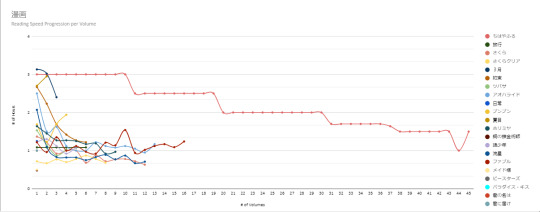
I clearly love ちはやふる and I am not ashamed to admit it.
I need to start reading longer manga. When I do, I’ll probably split this graph into less than and greater than 20 volumes. Imagine if I start reading something ridiculously long as 名探偵コナン or ワンピース, these graphs will start breaching the bounds of time and space.
Novels: Time Spent Reading per Chapter
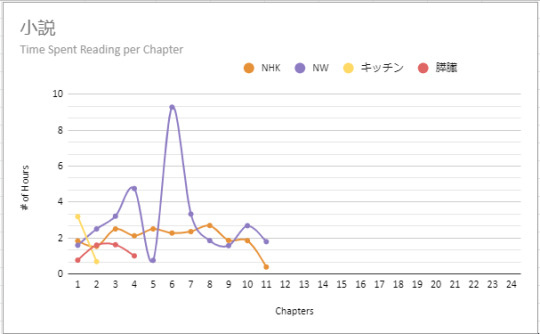
#neverforget the time I read chapter six of Norwegian Wood for 9 hours when it took me less than half that time in English RIP. Also, my interest in Kitchen plummeted LOL. Still planning to finish it don’t worry.
I also need to start branching away from manga and start reading more novels and light novels, too just so I can make more pretty graphs.
Visual Novels: Time Spent Reading and Daily Word Count
Also known as images that clearly show that I’ve already spent several days only reading the prologue of Island. I’m not sweating. 切那 needs to stop using words I don’t know in succession. More thoughts on this VN far into the future.
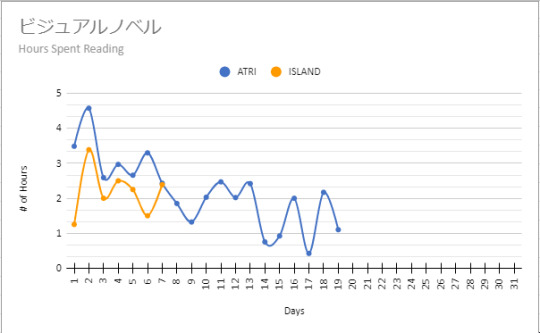
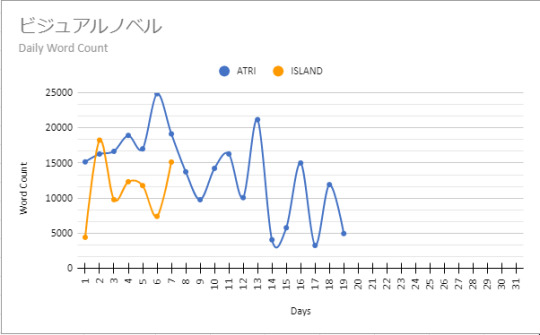
Thoughts on Immersion
I can’t really say anything else other that that it works for me, and needless to say if you’re considering this method, remember that the SRS is your friend but immersion should be your one true love.
Prior to all this, I couldn’t even read a sample paragraph from Genki without being confused to my very soul. Yes, I know, it’s embarrassing, but that’s the truth. I was way more scared of failing my Japanese classes than my actual thesis for my bachelors degree, I kid you not. I would quite literally spend all my free time in university trying to understand grammar, memorize vocabulary, and answer my workbook exercises with little to no success.
I tried so hard to get all the grammar “formulas�� into my head for 1.5 years and it only brought me more confusion. I’m never going back to traditional classroom study for language learning, but I will still refer to grammar books when I need to, and not because I feel like I need to answer 4783342 different workbook exercises like my life depended on it.
I still can’t believe it, but with immersion this statement is actually true to a point, don’t try shadowing anime/or calling your boss anime language slurs, use your common sense:
study anime to understand Japanese > study Japanese to understand anime
Future Goals/Plans
2,200 immersion hours was my initial goal, but honestly I feel like that number could be much higher. There’s still a lot of stuff I don’t understand (news, politics, sciences, etc.), so I’ll make attempts to cover more of those things in my immersion.
I’ll continue reading more, because that’s a natural SRS in itself. Try to read longer manga, more novels, visual novels, and light novels, and maybe news articles.
I’ll try to mine as much “JLPT vocab” as I can before making any attempts at taking the JLPT. I noticed that a lot of the words I know don’t appear in the JLPT word lists as much, even though they appear a lot in media/daily conversation.
Continue mining all words I don’t know because all words are useful anyway. There is no such thing as useless words. I never really understood mining only “interesting words” or words that “pop up” in your immersion. As I said in my previous blog post, 美人局 is an interesting word and I certainly caught it being said in my immersion, but in the three languages I know, I wouldn’t know when I would be able to use such a word, as compared to something like ジャガイモ which is a significantly less interesting word, but is certainly useful to know.
_
I have managed to talk up a storm, but if you have any questions regarding my process or recommendations for new immersion material, please feel free to send an ask/reply to this post. I love hearing about other people’s language learning/immersion journeys.
See you on my next post!
#language learning#japanese language#language acquisition#study blog#langblr#studyblr#graphs#language immersion#japanese#visual novels#manga#novels#anime#dramas#movies#youtube#podcasts
127 notes
·
View notes
Text
Most days I watch a lot of Youtube in English mostly because of streamed tabletop games and educational channels to just keep my brain fresh. But also cuz when I'm working and focusing on something else, I don't feel so bad about missing parts of it if I have to switch rooms or need to focus more on something that prevents me from getting all the content.
On my time off though, that's when I usually try to watch anime and stuff because I can give more focus to it. Or even if I look away and play a game on my app, I'm still mostly focused on what's happening on screen and can read subtitles or something because my app is on auto-fight and I just have to set up the next battle. But times when I need to look away a bit more like when I'm playing FFXIV and actually have to focus on some mechanics, it's useful for the thing in the background to be one of the two languages I understand and when I watch in Japanese, it makes me really happy sometimes to realize how much my fluency has increased since I was a kid.
Like since last night I was playing FFXIV and I binged all of Tokyo Revengers because some of my students are interested in it and I wanted to check it out, and just in general I was pretty pleased by how much I was able to follow because of my fluency level. I've come a long way, and that makes me really happy.
Right now though I'm watching the Cowboy Bebop live action. It's alright so far. The anime is still definitely superior, and like some of the flash back scenes seem weird, but I'm enjoying it more than I thought I would based on some of the reviews I saw. So far I don't have a huge problem with the action sequences, but the flashbacks do look really weird and cheap for some reason. Like flashback Julia so far looks like she's wearing a cheap ass wig and it's kind of annoying.
The anime though is one that was good in Japanese and English and I could flip back and forth between both versions and basically feel like I didn't experience a difference. That isn't true for a lot of anime though, so I think it's a testament to the quality of work that went into it.
EDIT: No, wait. That weird cut they did at the end of ep 1 where Vicious slices the guy's neck. That was just stupid or at least poorly executed. Vicious' look seems weird/off to me too.
Further along in and seriously the casting choice that I detest the most is Vicious. Like anime Vicious is very intimidating and cool, and live action Vicious seems like a pathetic sad sack. Like in the original anime, you really got the feeling that Spike and Vicious were not only rivals, but like parallel and like equal yet opposite, and that helped make the story compelling. This Vicious is just really bad and I don't like feel like he can even compare to Spike and he has a chip on his shoulder over him as well.
Like others, the lack of Ed really leaves me wanting, and it's annoying that Ed isn't here in order to get to the story arc with Vicious faster, but Vicious is a very weak rendition so it's not even worth it. It would definitely have been better if they cast Ed, took their time getting to Vicious, and did a better job with that character including casting because I don't think the actor that they cast for him really fits Vicious at all. Like he's supposed to have a look similar to Goemon Ishikawa, but the actor they picked is a bit more like a thug.
Julia also gets too much actual screen time. She was better with more mystery instead of them inventing a personality and stuff for her, and why the fuck is she actually married? She was like associated with the Syndicate too, so why does she need "protection"? One of the compelling things about her in the anime was that she was literally neutral and didn't actually pick anyone until right before she died. Apparently they give her more agency in an upcoming episode I haven't seen yet and say that they want to allow her to give her more agency even though they start the series off with her under Vicious' thumb.
But like....that's stupid because in the original she was never under Vicious' thumb. They weakened her only to build her back up in the way they wanted. WHAT THE FUCK. Like in the anime, even though she isn't explored a lot, her agency in the story is the fact that she chose to help Spike which kicked off the affair, and then when she was given an ultimatum to kill Spike herself or both of them die, she chose neither and just up and left Spike to die. She's in hiding for most of the anime and Vicious is chasing her because of her choice. I feel like this plot and POV for this live action was written by men who don't know how women make choices. She has has agency and made her choice of moral ambiguity and chose herself rather than either man vying for her. Julia was a very strong, competent, and independent woman and viewed as a femme fatale in her own right. What the fuck is up with this wife shit? That they wrote her to have made a choice is what actually robs her of her agency.
0 notes